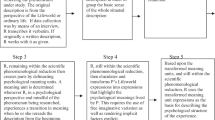Abstract
Durganand Sinha was a true visionary in proposing the integration of Indian psychological thought with modern psychology. Post the publication of his 1965 article, there have been certain developments in the growth of the discipline of Consciousness Studies, which explicitly bear the mark of his contentions. As far as India is concerned, he most certainly influenced the growth of Indian Psychology (IP). Building on his insights while simultaneously critiquing them, the commentary concludes by offering new pathways as to how IP can be advanced as a discipline.
Similar content being viewed by others
Data Availability
Not applicable.
Abbreviations
- APA:
-
American Psychological Association
- IP:
-
Indian Psychology
- UGC:
-
University Grants Commission
- WSCF:
-
World Student Christian Federation
References
Clarke, J. J. (1997). Oriental enlightenment: The encounter between Asian and Western thought. Routledge.
Cornelissen, R. M. M. (2002). Pondicherry manifesto of psychology. Psychological Studies, 47, 168–169.
Cornelissen, R. M. M., Misra, G., & Verma, S. (Eds.). (2011a). Foundations of Indian Psychology, Volume 1: Theories and concepts. Pearson.
Cornelissen, R. M. M., Misra, G., & Verma, S. (Eds.). (2011b). Foundations of Indian Psychology, Volume 2: Practical applications. Pearson.
Cornelissen, R. M. M., Misra, G., & Verma, S. (Eds.). (2014). Foundations and applications of Indian Psychology. Pearson.
Goleman, D., & Davidson, R. J. (2017). The science of meditation: How to change your brain, mind, and body. Penguin.
Rao, K. R., Paranjpe, A. C., & Dalal, A. K. (Eds.). (2008). Handbook of Indian Psychology. Cambridge University Press.
Rao, K. R., & Paranjpe, A. C. (2016). Psychology in the Indian tradition. Springer.
Rogers, C. R. (1955). Persons or science? A philosophical question. American Psychologist, 10(7), 267–278. https://doi.org/10.1037/h0040999
Sathiyaseelan, A., & Sathiyaseelan, B. (2016). A comparison of Maslow’s theory of hierarchy of needs with the pancha kosha theory of Upanishads. Artha Journal of Social Sciences, 15(1), 59–68. https://doi.org/10.12724/ajss.36.4
Singh, K. (in press). Colonization and Indian Psychology: A reciprocal relationship from the perspective of Indian postcolonial theory. In Robert W. Hood, Jr. & Sariya Cheruvallil-Contractor (Eds.), Research in the social scientific study of religion (Vol. 34). Brill.
Singh, K. (2022). There isn’t only cultural blindness in psychology; psychology is culture blind. In Robert W. Hood, Jr. & Sariya Cheruvallil-Contractor (Eds.), Research in the social scientific study of religion (Vol. 32, pp. 399–426). Brill.
Singh, K. (2014). Beyond mind: The future of psychology as a science. In R. M. M. Cornellisen, G. Misra, & S. Varma (Eds.), Foundations and applications of Indian Psychology (pp. 40–52). Pearson.
Singh, K. (2011). Beyond mind: The future of psychology as a science. In R. M. M. Cornellisen, G. Misra, & S. Varma (Eds.), Foundations of Indian Psychology: Concepts and theories (pp. 86–102). Pearson.
Singh, K. (2008). The evolution of Integral Yoga: Sri Aurobindo, Sri Ramakrishna, and Swami Vivekananda. VDM Verlag.
Singh, K. (2004). Relativism and its relevance for psychology. In K. Joshi & M. Cornellisen (Eds.), History of science, philosophy, and culture in Indian civilization: Volume X1 part 3: Consciousness, Indian Psychology and yoga. Center for Studies in Civilizations.
Singh, K. (2003). Relativism, self-referentiality and beyond mind. In C. Chakroborti, M. K. Mandal & R. B. Chatterjee (Eds.), On mind and consciousness: Selected papers from the MiCon 2002 conference. Indian Institute of Technology & Indian Institute of Advanced Study.
Singh, K. (2001). Beyond postmodernism: Towards a future psychology. In M. Cornellisen (Ed.), Consciousness and its transformation. Sri Aurobindo Ashram.
Sinha, D. (1965). Integration of modern psychology with Indian thought. Journal of Humanistic Psychology, 5(1), 6–17. https://doi.org/10.1177/002216786500500102
Sinha, D. (1981). Non-western perspectives in psychology: Why, what and whiter? Journal of Indian Psychology, 3, 1–9.
Sinha, D. (1986). Psychology in a third world country: An Indian experience. Sage.
Sinha, D. (1996). Culturally rooted psychology in India: Dangers and developments. International Journal of Psychology, 30, 99–110.
Sinha, D. (1997). Indigenizing psychology. In J. W. Berry, Y. Poortinga, & J. Pandey (Eds.), Handbook of cross-cultural psychology: Theoretical and methodological perspectives (Vol. 1, pp. 129–169). Allyn & Bacon.
Sinha, D. (1998). Changing perspectives in Social Psychology in India: A journey towards indigenization. Asian Journal of Social Psychology, 1(1), 17–31. https://doi.org/10.1111/1467-839x.00003
Acknowledgements
Not applicable.
Funding
Not applicable.
Author information
Authors and Affiliations
Contributions
I am the sole author with everything about the article conceptualized and written by me.
Corresponding author
Ethics declarations
Conflict of interest
Not applicable.
Ethics Approval
Not applicable.
Consent to Participate
Not applicable.
Consent for Publication
Not applicable.
Additional information
Publisher's Note
Springer Nature remains neutral with regard to jurisdictional claims in published maps and institutional affiliations.
Rights and permissions
Springer Nature or its licensor (e.g. a society or other partner) holds exclusive rights to this article under a publishing agreement with the author(s) or other rightsholder(s); author self-archiving of the accepted manuscript version of this article is solely governed by the terms of such publishing agreement and applicable law.
About this article
Cite this article
Singh, K. Indianizing Psychology: Continuing the Legacy of Durganand Sinha. Psychol Stud (2023). https://doi.org/10.1007/s12646-023-00733-7
Received:
Accepted:
Published:
DOI: https://doi.org/10.1007/s12646-023-00733-7



